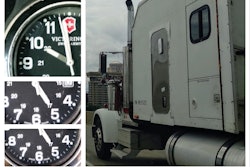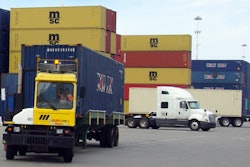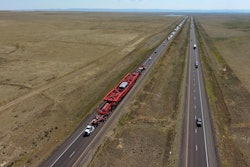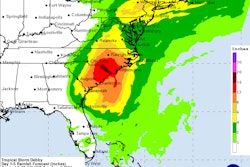After towing and recovery industry voices dominated the Federal Motor Carrier Safety Administration's public meeting on bringing a measure of transparency to towing fees charged to motor carriers, trucking struck back in comments to the docket on the Federal Register with some hair-raising predatory towing horror stories.
While Overdrive has long reported on egregious tow bills issued to motor carriers, and the ways to fight them, new commentary from trucking and insurance industry veterans raises the stakes again.
[Related: DOT's Buttigieg, FMCSA call out predatory towing, propose penalties]
Itemized charges like $2,250 for the use of traffic cones; $475 for a broom; a $9,200 surcharge for working in "extreme heat and humidity" -- these are just a few of the fees trucking and insurance industry voices put before FMCSA.
As FMCSA said in announcing the Friday, June 21, listening session: "Once towed, CMV owners and operators are in a very vulnerable position and highly susceptible to predation. Predatory towing companies can use their possession of the vehicle as leverage to price gouge and otherwise prey upon CMV owners and operators who are in no position to push back."
After the comment period closed on August 1, the majority of comments had come from tow company operators who strongly oppose further regulation. FMCSA, and even the trucking and insurance industry voices who support the new regulations, largely voiced support for the towing industry generally, too, saying it's mostly hardworking people who provide vital services at great risk.

[Related: Tow company defends 'predatory' practices]
But the specific examples of some invoices reported include eye-popping figures, as the Department of Transportation seeks to include tow charges in the Federal Trade Commission's effort to ban junk fees of all stripes.
The American Property Casualty Insurance Association, the nation’s largest business and home insurance association, said "we have unfortunately witnessed" predatory towing invoices "numerous times," and that the American Transportation Research Institute's 2023 report on the problem "only scratched the surface."
APCIA gave the example of one insurance-company member getting an invoice from a tow truck operator in Arkansas for more $95,000. "While the total amount is concerning on its own," it wrote in its comment to FMCSA, "what is even more troubling is some of the auxiliary fees that were itemized on the invoice."
For example: APCIA went on, "the tow truck operator charged the policyholder $2,250 for the use of traffic cones and signs during the recovery of the vehicle, and another $2,250 for traffic control during the clean-up effort.". Another ACPIA member received invoices charging $675 for battery lights, $475 for a broom and $1,588 for boots, gloves and other apparel.
ACPIA, among others, also took aim at "administrative fees"
The Owner-Operator Independent Drivers Association filed a comment in support of FTC getting involved in the push against high tow fees, citing the uncertainty inconsistent fees cause drivers and also the exotic and expensive nature of predatory billing.
"We have seen countless types of 'administrative' fees," OOIDA said. "Charges for storage rates when the towing business is closed or inaccessible, gate fees just to step foot on a towing property, uncapped subcontracting/sublet rates, cleaning expenses, and inclement weather/excessive heat costs are some of the ways that towing bills get escalated. ... Truckers can also be on the hook for any damages to the towing equipment during recovery, such as straps and air bags. Not to mention getting billed for communication fees for the use of two-way radios and even hydration fees which force truckers to cover meals/beverages for the towing company."
It was OOIDA that provided that example of $9,200 for heat and humidity fees, which was then marked up another 10% with administrative add-ons.
The subcontracting problem mentioned by OOIDA rang true for others as well. The Virginia Trucking Association shared a comment citing their "most shocking example" of predatory towing as an invoice for $202,000 for towing and recovery work that was actually subcontracted to another company who only charged $25,000. The latter figure, VTA said, "is about what the trucking company would have expected to pay." Eventually, the trucking company negotiated the bill down to $90,000.
"Although the primary towing company sought to recover eight times its cost," VTA wrote in its comment, "it was able to take advantage of the lack of regulation or oversight to receive payment for three and a half times the actual cost, with impunity."
Another example shared by VTA: "Another complaint involved a charge of $13,950 to recover an estimated 100 to 200 sticks of lumber (2 x 4 x 16) scattered over approximately 100 feet of a travel lane and shoulder, with no collision or damage to any motor vehicle and the tractor-trailer remaining operational."
The American Trucking Associations encouraged the creation of state towing and recovery boards that set rates and review business practices.
[Related: Trucking fights back against predatory towing: State laws that level the playing field]
The National Insurance Crime Bureau urged FMCSA to make towers disclose rate sheets and to have police forces evaluate the rates towing companies can charge.
The National Owner Operators Association filed a comment describing an $18,000 tow bill seen in Georgia, veering into a discussion of the issue of broker transparency -- sometimes, the broker might end up paying a tow bill.
Individuals and small businesses had their say, too, though many were towing companies disputing the problem or the need for any new rule at the federal level.
One individual told the story of a towing company giving away a load of watermelons in Brooklyn, New York, which a local news outlet wrote about. Later, that towing company demanded payment from the trucking company for keeping the watermelons stored and refrigerated, the commenter said. "They were relentless in demanding exorbitant fees and levied threats. It was not until I pointed out this news article, and the fact that the tow company actually gave away product without our customers' permission, that the harassment from the tow company and its 'legal representative' subsided."
Plenty other minor, but still seemingly disproportionate, charges populated the examples shared by commenters. $1,400 for a 30-mile tow, deceptive practices at a truck stop leading to paid parking customers getting a boot, the list goes on.
[Related: Parking-lot-trap tows, roadside tows: Truckers' best defense against predatory practice]
But, like anyone working the spot market for freight knows, stopping bad actors isn't as simple as writing a rule. One major law firm supported action on predatory towing, but seriously questioned just how, or if, it could be done through regulatory action.
Scopelitis, a leading transportation law firm, supported predatory towing falling under FTC's proposed rule around Unfair or Deceptive Fees, but mapped out some challenges for a successful implementation. Citing the "state by state fragmented web of statutes, regulations, administrative codes, and even county and municipal regulations" governing towing, Scopelitis found that requiring "prior, written disclosure of total costs" might work for consensual tows, "but it will likely be difficult to enforce in nonconsensual situations where a motor carrier is not accessible."
Though there are indeed many states that "have regulated maximum charges for nonconsensual tows," Scopelitis added, "wreckers can navigate around those by claiming more equipment and manpower than necessary." The firm thus echoed past predatory towing horror stories that found instances of unnecessary vehicles or manpower. Instead, "a more pragmatic approach could be working with states and partners in highway patrol (through CVSA) to develop more uniform anti-predatory regulatory programs."
Scoeplitis concluded that there's no "easy" path forward on predatory towing, but that it supports an effort nonetheless.
For Overdrive's guide on how to fight back against predatory towing when it happens to you, follow this link.
[Related: Trucking's best defense against predatory towing: A step-by-step guide]











